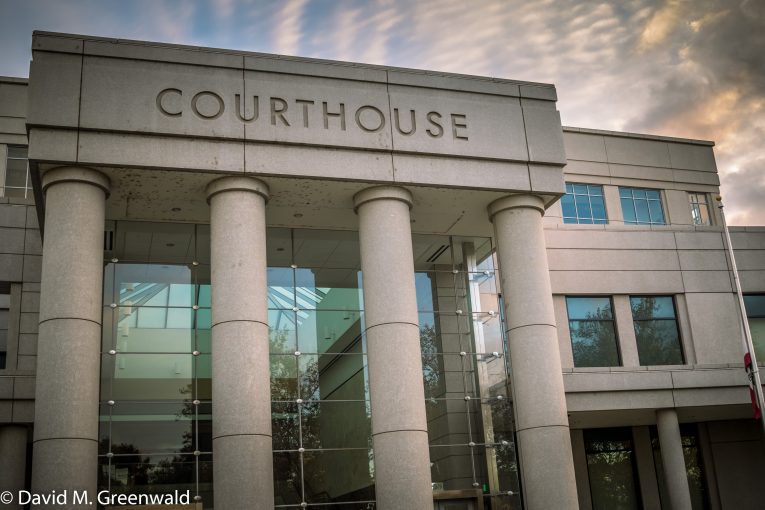

By Pedro Maturana
The trial of Markeese Carter resumed Friday morning with a hearing as Carter’s defense filed for a motion to suppress the audio and video recordings with him affirming his Miranda rights and later confessing to his crimes. Carter— a 27-year-old Sacramento resident— is being charged with the abuse, sexual assault, and murder of his 4-year-old daughter, Aminatu-Amaya Abdul-Raafi.
Deputy District Attorney Carolyn Palumbo asked the court to play the audio of the recording, during which the arresting officer read Carter his Miranda rights as he sat in a patrol car. Carter’s voice filled the courtroom as he clearly said “yes” each time the officer asked him if he understood.
Carter’s attorney, Deputy Public Defender Ron Johnson, stated that the prosecution is in denial about Mr. Carter’s mental health diagnosis, pointing to documentation of PTSD and schizophrenia. Johnson argued that Carter’s past diagnoses may impede his ability to understand his Miranda rights and that his subsequent confessions are not admissible as evidence against him. Additionally, before Carter made his confessions, he asked for a lawyer. Johnson seemed to imply that Carter’s invocation of counsel made any confession thereafter inadmissible as evidence.
Palumbo acknowledged Carter’s diagnosis but added that without a health professional to interpret the documentation and assess how his illness affects his ability to understand his Miranda rights, the documentation is irrelevant.
Johnson requested a short postponement to the hearing to find a doctor that can give an expert opinion. Palumbo argued that this hearing had been set for a couple weeks already and that the defendant filed this motion in May of 2018. From May until now the defense has not consulted a medical professional.

Mr. Johnson claimed that he didn’t think he would need a health professional’s opinion since Carter’s behavior in the recordings would be enough to show the severity of his mental illness.
The prosecution insisted that the hearing move forward. Palumbo argued that Carter knowingly waived Miranda rights. There is nothing in the recording that shows he did not understand.
Judge Paul Richardson agreed that recordings reveal Carter’s struggles with mental illness, but asked Johnson show more specifically what in the record would be relevant to be interpreted by a professional. If Johnson could show this, then the hearing should not move forward.
Johnson explained the events during Carter’s time in custody included two different interviews. About 3.5 hours after his first interrogation in the patrol car, Carter was taken to jail. Yolo County Sheriff’s detective Juan Ceja asked Carter if he remembered when the officer read him his Miranda rights. Carter remembered.
Ceja described Carter’s answers as “clipped”— using only one to two words— and guarded. Carter rocked back and forth in his chair, humming to himself. At one point he teared up. Later in the interview Carter charged at Deputy Ceja and was taken down and restrained. Carter then requested to talk to Ceja once more. This time Carter was restrained in a chair with belts. He wore a smog and spit mask.
In his exchange with Ceja, Carter mentioned that he wanted a lawyer and “mitigating factors.” A confused Ceja tried to clarify what he meant, but Carter continued to make bizarre statements.
Carter mentioned that he suffers from blackouts and that people in his head force his actions. At some point Carter mentioned MKUltra, a CIA mind control program.
“We’re just trying to find out what happened to your poor daughter,” Ceja told Carter. At this point Carter mentioned that she was not his daughter.
Ms. Palumbo began her next argument by describing Carter’s crimes in detail. Aminatu was drugged, sexually assaulted, and thrown into Putah Creek. Palumbo claimed that Carter indicated that he understood the Miranda statements read to him. She stressed that during the third interview Carter confessed to his crimes, and it is this confession the defense seeks to suppress. “A confession is like no other evidence,” Palumbo argued.
Palumbo claimed that the defense had no foundation for mental illness. In this case, there is no expert opinion that Carter could not understand his rights. Additionally, after Carter asked for a lawyer and “mitigating circumstances,” Ceja tried to clarify and said, “If you’re asking for a lawyer, then we’re done talking.” After this, Carter began talking on his own without coercion by the police.
Judge Richardson asserted that there is nothing that could make the court believe that Mr. Carter did not knowingly, intelligently, and voluntarily know his rights. The recordings show that Carter tracked his questions. Additionally, during the second interview, since Carter initiated the conversation by his own volition when he said, “that was not my daughter,” he was not coerced by the police. His statement regarding wanting a lawyer did not fall into a validation of his 5th Amendment rights. His subsequent confession was, therefore, admissible as evidence.
Judge Richardson denied the motion to suppress sought by defendant.
